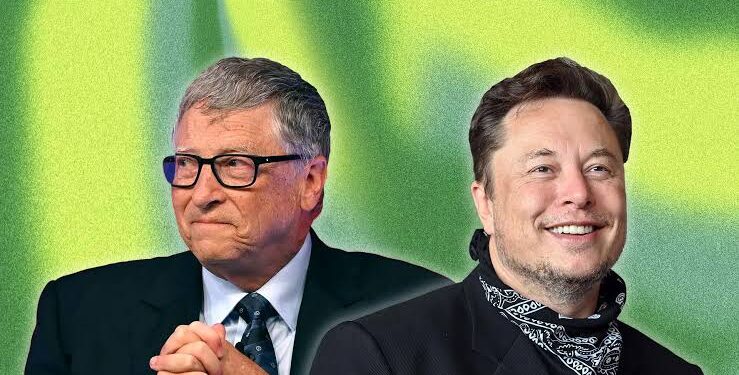By Emmanuel Nduka
As the Bill & Melinda Gates Foundation marks its 25th anniversary with plans to wind down operations by 2045, its co-founder Bill Gates is making headlines for more than just philanthropy.
In a pointed series of remarks, Gates has accused the world’s richest man, Elon Musk, of contributing to a global crisis in aid and public health by willful neglect and influence.
Speaking candidly in an interview, Gates painted a stark picture of how recent years, under the weight of political indifference, pandemics, and rising nationalism, have reversed decades of progress in global health. Yet one name, he suggests, looms larger than most in this decline: Musk’s.
“He put it in the wood chipper,” Gates said bluntly, referring to the decimation of U.S. foreign aid. “Because he didn’t go to a party that weekend.”
The comment, layered with sarcasm and frustration, landed as a not-so-veiled critique of Musk’s apparent disinterest in humanitarian causes, and the broader cultural shift he symbolizes.
While Musk remains nominally tied to the Giving Pledge, Gates noted, there’s little sign that he’s lived up to it in practice. “Technically he’s still attached. But I haven’t seen evidence that he’s actually committed to it. In the meantime, the world’s richest man has been involved in the deaths of the world’s poorest children,” Gates said.
These are not words Gates uses lightly. Over the past 25 years, the Gates Foundation has invested over $100 billion in global health initiatives, cutting childhood mortality in half and driving innovations in vaccines, diagnostics, and disease prevention. But much of that progress, Gates fears, is being unraveled.
He cites recent data with alarm: with foreign aid slashed under the Trump administration, an 80% cut to USAID, the sidelining of HIV and malaria programs, the world could see an additional one million child deaths per year. “Because of these cuts, millions of additional deaths of kids,” Gates warned.
In Gates’s view, Musk isn’t solely responsible, but emblematic of a troubling new era where wealth is concentrated in the hands of individuals focused on space travel, AI, or social media influence, while basic human needs go unmet. “The Golden Rule hasn’t been repealed,” Gates insists, but it’s clearly being ignored.
“There’s a logic to solving tuberculosis. It’s criminal not to solve TB. It’s criminal not to solve HIV. It’s criminal not to eradicate malaria,” Gates said.
Even as the Gates Foundation prepares to spend the remaining $200 billion of its endowment over the next two decades and shut its doors, Gates made clear he isn’t stepping back from advocacy. His message was as much a challenge to other billionaires as it was a plea to governments: recommit to helping those in need — or be complicit in avoidable death.
The implication is clear: the world doesn’t just need money. It needs moral leadership. And in Gates’s eyes, Elon Musk has so far failed that test.




































